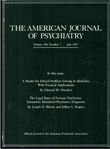Outcome following ECT for primary unipolar depression: a test of newly proposed response predictors
Abstract
This study considered dexamethasone suppression test (DST) results, Winokur 's familial subtyping, and the presence or absence of melancholia according to DSM-III criteria as potential predictors of response to ECT. Familial subtype and DST results independently predicted outcome after ECT, but melancholia did not. Relationships between outcome and several other traditional items tested for comparison generally agreed with those in earlier studies. The pattern of significant predictors varied considerably depending on outcome measure--Hamilton depression score at discharge, global rating at discharge, or symptom score during a 6-month follow-up--which may explain some of the discrepancies between results of earlier predictor studies.
Access content
To read the fulltext, please use one of the options below to sign in or purchase access.- Personal login
- Institutional Login
- Sign in via OpenAthens
- Register for access
-
Please login/register if you wish to pair your device and check access availability.
Not a subscriber?
PsychiatryOnline subscription options offer access to the DSM-5 library, books, journals, CME, and patient resources. This all-in-one virtual library provides psychiatrists and mental health professionals with key resources for diagnosis, treatment, research, and professional development.
Need more help? PsychiatryOnline Customer Service may be reached by emailing [email protected] or by calling 800-368-5777 (in the U.S.) or 703-907-7322 (outside the U.S.).



